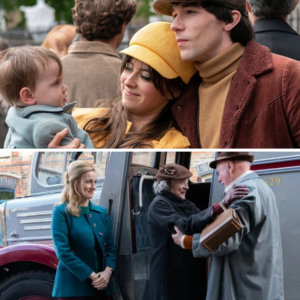At the 78th Cannes Film Festival last week, Jodie Foster took the stage in a way few expected: starring in her first major French-language role in two decades. The film, A Private Life (Vie Privée), directed by French filmmaker Rebecca Zlotowski, premiered out of competition on May 20, earning a 10-minute standing ovation and widespread praise for Foster’s impeccable French and nuanced performance. In a series of interviews during the festival, Foster opened up about why she chose the role of psychiatrist Lilian Steiner, revealing a deeply personal connection to the project that speaks to her lifelong love for French culture, her desire for authentic storytelling, and her willingness to embrace vulnerability on screen. As fans and critics continue to buzz about her performance, Foster’s reflections offer a window into the motivations of a Hollywood icon who, at 62, is still seeking roles that challenge and transform her.
A Role 15 Years in the Making
For Jodie Foster, A Private Life was more than just another film—it was a role she had been waiting 15 years to play. In an interview at the Deadline Cannes Studio on May 22, Foster shared, “This was the role I waited 15 years for.” The statement, which quickly spread across social media platforms like X, underscores the significance of this project in her illustrious career. Foster, a two-time Oscar winner for The Accused (1988) and The Silence of the Lambs (1991), has long been a Cannes regular, with films like Taxi Driver (1976) and Money Monster (2016) premiering at the festival. She was even honored with an Honorary Palme d’Or in 2021. But A Private Life marks a new milestone: her first leading role in a French-language film since 2004’s A Very Long Engagement, and a return to the kind of character-driven dramas that defined her early career.
Foster plays Lilian Steiner, a renowned Parisian psychiatrist who becomes convinced that her patient Paula (Virginie Efira) was murdered, despite reports of suicide. The film, a psychological thriller with elements of comedy and drama, follows Lilian as she mounts a private investigation, aided by her ex-husband Gabriel (Daniel Auteuil). The role is a complex one, requiring Foster to portray a woman unraveling under the weight of guilt and obsession, while also navigating moments of humor and vulnerability. Reviews have praised her performance, with Variety calling it “a thrill to see Foster navigating a fully bilingual role,” and The Hollywood Reporter noting her “spiky vitality and unexpected playfulness.”
So why this role, and why now? Foster’s decision to take on A Private Life was rooted in a combination of personal and professional desires. “I’ve been wanting to go back and do a French movie, because I haven’t done one in a long time,” she told Variety on May 21. “For me, it’s always about trying to find the right piece of material.” Foster, who attended the Lycée Français de Los Angeles and speaks fluent French, has a deep connection to the language and culture, having appeared in Gallic productions like Stop Calling Me Baby! (1977) and The Blood of Others (1983). But she admitted to being “too scared” to take on leading French roles in the past, citing the challenges of the dialogue and her fear of making mistakes. “When I act in French, I’m a totally different person,” she said. “I have a much higher voice, I’m much less confident, and I get very frustrated.”
A Collaboration Built on Trust
The turning point came when Foster met Rebecca Zlotowski, a French director whose work she had long admired. Zlotowski, known for films like Other People’s Children (2022) and An Easy Girl (2019), had been dreaming of working with Foster since her debut film Belle Épine (2010), where she envisioned the actress in a small role that never came to fruition. The two finally met in Los Angeles a decade later, spending six to seven hours reviewing the script for A Private Life word for word. “I knew then that Rebecca was someone who took her work very seriously; that she had specific ideas for every aspect of the film,” Foster recalled at the Cannes Film Festival on May 20. That meeting, as reported by Deadline, was the foundation of a collaboration built on mutual respect and a shared vision.
Foster was drawn to Zlotowski’s commitment to authentic French cinema. “I didn’t want to make a big Franco-American co-production, a big fancy film,” she explained in the Deadline Cannes Studio interview. “I really wanted to make a real, authentic French movie, and everything that comes with that—the auteur cinema spirit and that the filmmaker is everything.” Zlotowski’s approach, which blended a Hitchcockian mystery with introspective drama and subtle comedy, resonated with Foster’s desire for narrative-driven roles. “I’m interested in narrative,” she told Variety. “I’m all about developing a character who propels the story. This ticked all the boxes.”
The role of Lilian Steiner also offered Foster a chance to explore a character at a crossroads. “I connect to the midlife part,” she said in the Deadline interview, adding with a laugh, “But maybe, actually, I’m a little older than midlife, so I’m like the post-midlife part.” Lilian, a tightly wound psychiatrist who begins to unravel as she investigates Paula’s death, experiences a “midlife turnaround,” forcing her to confront her own vulnerabilities and blind spots. Foster, who has often played characters undergoing transformation—from Clarice Starling in The Silence of the Lambs to Liz Danvers in True Detective: Night Country (2024)—found a personal connection to this journey. “Weirdly, I feel like I’ve been playing a midlife crisis my entire life, from the time I was young,” she said. “I think there’s something about characters that have to transform, that have to suddenly become aware, because their survival mechanisms are making them cut off.”
Embracing Vulnerability in French
One of the most compelling aspects of Foster’s decision to take on this role was the opportunity to embrace vulnerability in a language that, while fluent for her, still feels foreign. “I have a totally different voice in French than I do in English,” she told Reuters on May 22. “My voice is much higher and I’m more careful in French, because I’m worried about making a mistake. I’m a little more vulnerable. Yeah, I have a different personality… that’s fun to work with.” This vulnerability added a layer of authenticity to her portrayal of Lilian, whose own emotional armor begins to crack as the story unfolds.
Critics have lauded Foster’s command of the language, with Allociné reporting festivalgoers’ reactions: “Jodie Foster est incroyable avec un français si parfait” (“Jodie Foster is incredible with such perfect French”). Her diction, described by Actu.fr as “voluntarily slowed” to reflect Lilian’s emotional restraint, became a subtle sign of the character’s inner turmoil. Foster’s ability to navigate the language while infusing her performance with humor, intensity, and fragility has been a highlight of the film, with Deadline noting that she “doesn’t miss a beat in either the darker moments or some of the lighter ones.”
A Film That Defies Expectations
A Private Life itself is a departure from the typical Hollywood thriller, blending genres in a way that Foster found refreshing. The film, which Screen Daily described as an “odd, uneven, likeable whodunnit,” combines elements of a murder mystery with a comedy of remarriage and a character study of a woman on the brink. Lilian’s investigation into Paula’s death leads her to confront her own guilt—did she inadvertently contribute to the suicide with the drugs she prescribed?—and even dabble in hypnosis, a practice she once dismissed as quackery. The screenplay, co-written by Zlotowski, Anne Berest, and Gaëlle Macé, also explores Lilian’s strained relationship with her son (Vincent Lacoste) and her rekindled connection with her ex-husband Gabriel, played with amiable charm by Daniel Auteuil.
Foster was drawn to the film’s refusal to fit neatly into one box, a freedom she feels is rare in American cinema. “Aux États-Unis, on n’a pas la liberté de faire des films comme Vie Privée—tout doit rentrer dans une case,” she told Libération on May 22 (“In the U.S., we don’t have the freedom to make films like Vie Privée—everything has to fit into a box”). The film’s tonal shifts—from suspense to humor to introspection—allowed Foster to stretch her acting muscles in ways she hadn’t in years, particularly in comedic scenes opposite Auteuil, which Deadline described as a “crackerjack scene right out of Nancy Drew.”
A Milestone in a Storied Career
For Foster, choosing the role in A Private Life was about more than just the script—it was about reclaiming a part of herself. Her love for French culture, her desire to work with a filmmaker like Zlotowski, and her willingness to step into a space of vulnerability all converged to make this project a milestone in her career. “I wanted to be part of a truly French production,” she said at Cannes, a sentiment echoed in posts on X from festival attendees who praised her commitment to authenticity.
As A Private Life prepares for its theatrical release later this year through Sony Pictures Classics in North America and Ad Vitam in France, Foster’s performance is already being hailed as a triumph. For an actress who has spent her life transforming through her roles, this project represents a new chapter—one where she not only solves a mystery on screen but also solves a personal one: how to keep evolving, keep challenging herself, and keep finding joy in the art of storytelling. And for fans, it’s a reminder that Jodie Foster, whether in English or French, remains a force of nature, capable of captivating audiences with every word.





